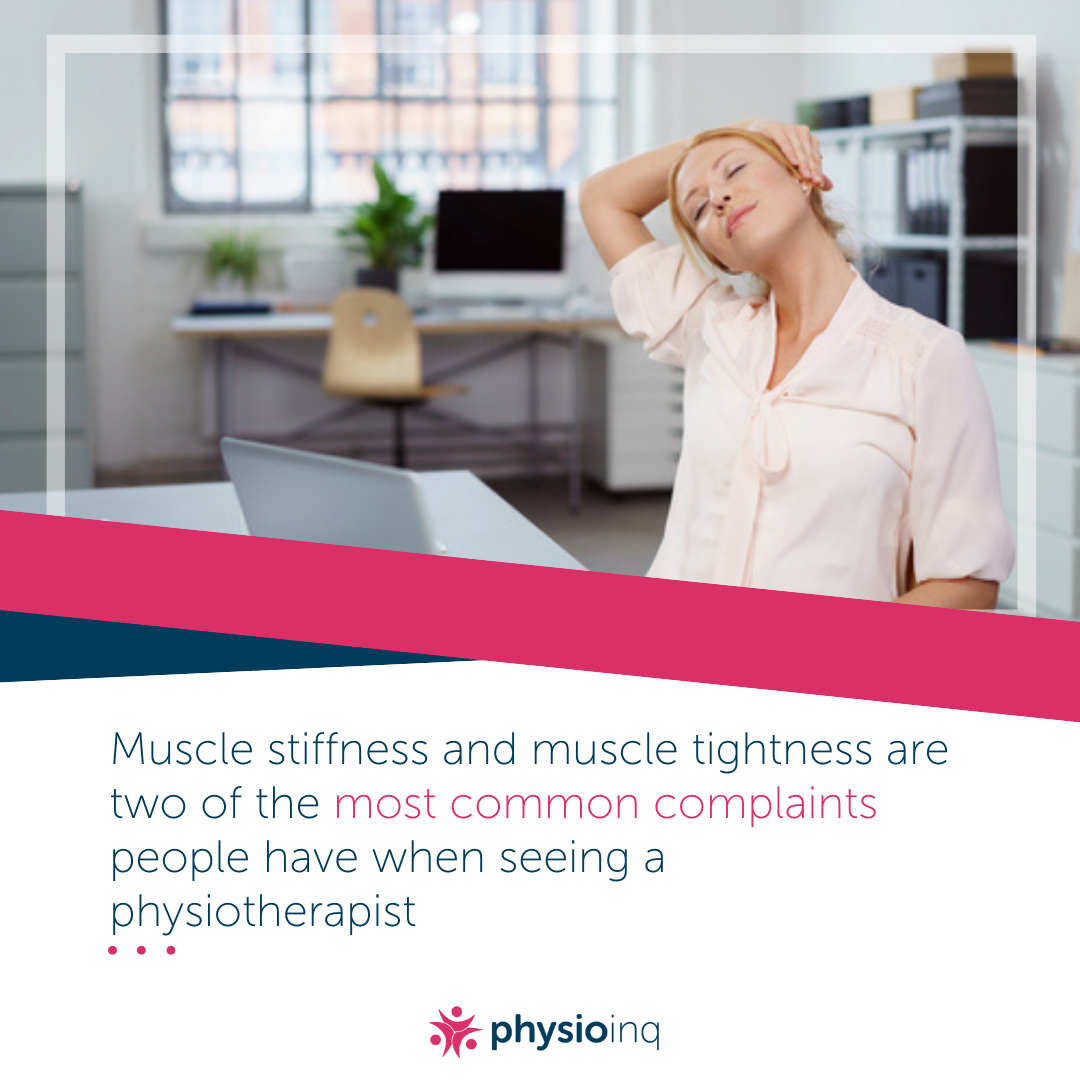Make an Appointment
Are you the person who seems to catch the cold multiple times per year?
Do you deal with chronic sinus infections?
Do you suffer from those annoying seasonal allergies?
If so, have you noticed that when your sinuses are congested, your neck also starts to ache?
There is a connection between sinus pressure and neck pain. While not all neck pain is caused by sinus issues, the two are closely linked because the muscles and nerves in your face, head, and neck work together.
In this blog, we’ll explore why sinus problems sometimes lead to neck pain, how you can relieve it, and when physiotherapy or medical care might be needed.
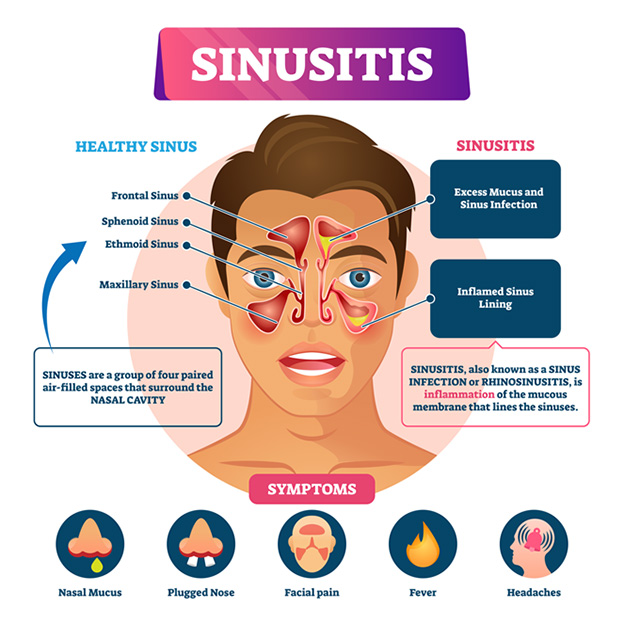
Understanding Sinus Pressure and Neck Pain
Before looking at ways to ease sinus-related neck pain, it helps to understand what sinus infections are and how they can affect nearby muscles and nerves.
What is a sinus infection?
A sinus infection, also known as sinusitis, creates pressure in the nasal cavity and causes pain and discomfort. Sinusitis can be caused by a virus, bacteria, and in some rare cases, fungus.
Sinus infections are often confused with the common cold because they present similar symptoms. However, they are two different ailments and colds often cause sinus infections, which often last longer than someone who only got a cold.
Common symptoms of sinusitis include:
- Sinus pain and pressure
- Headaches
- Postnasal drip
- Persistent coughing
- Fever
- Thick, coloured mucus
- Fatigue
- Bad breath
- Tooth pain
Unlike a simple cold, which usually clears within three to five days, a sinus infection can last for up to 10 days. In some cases, sinusitis becomes chronic, lingering for eight weeks or more.
You can read more about this condition at Better Health Victoria – Sinusitis.
How Can Sinus Pressure Affect the Neck?
The muscles and nerves in your face, head, and neck are closely connected. When sinus pressure builds up, it can create headaches that radiate into the neck and shoulders.
Sinus issues may cause neck pain by:
- Triggering tension headaches that spread into the neck muscles
- Causing inflammation that affects nearby joints and soft tissues
- Leading to fatigue and poor sleep, which makes the neck feel stiff and sore
Sometimes the relationship works both ways. If you already have neck tension, poor posture, or an old injury, sinus congestion can make the discomfort feel worse.
When Is Neck Pain with Sinus Pressure a Concern?
If you notice sinus pressure combined with fever and neck stiffness, you should see a doctor straight away. While rare, these symptoms together can be a sign of a more serious infection such as meningitis.
If your sinusitis lasts for more than 7 days, you’ve had a fever for 3-4 days, or if you feel like you’re in particularly intense pain, you should go see your doctor for the best advice.
Neck Pain and Sinus Pressure
The two main symptoms of sinusitis associated with neck pain are sinus pain/pressure and headaches. These symptoms can present themselves down into your neck since the muscles of your face and neck are all connected.
While the two aren’t always connected, there’s a good chance that you’ll get a sore neck whenever you deal with sinus pressure, whether from sinusitis, allergies, or the common cold.
Why does my neck hurt when my sinuses are bad?
Your next may hurt when your sinuses are plugged up because the muscles in the front of your neck as well as by your trapezius are involved. However, there are a few possible reasons why your next might hurt whenever your sinuses get clogged or painful.
Weather Changes Cause Allergies & Muscle Pain
Allergies and hay fever are caused by seasonal changes that can also affect your muscles and joints. Pollen in the air can cause inflammation in the body which is why your nasal passages become obstructed. But, the inflammation doesn’t necessarily stay confined to your nose.
Inflammation also notoriously causes joint pain. For some, even the slightest weather changes can be felt as aches and pains in your body. So, for the same reason that your nasal cavity becomes inflamed due to seasonal allergies, your neck pain might also be caused by seasonal changes.
Neck Pain Can Be Caused By Tense Muscles
It’s no secret that our muscles start to act when we’re particularly tense or stressed out. If you’re experiencing sinus pressure and pain, you’re probably fatigued from lack of sleep and constantly bracing yourself while coughing and sneezing.
Especially if you have an underlying neck injury, joint issues, or spinal disc conditions, all that tension could manifest itself as neck pain.
Sphenoid Sinus Pressure is Felt in the Neck
You might also be experiencing neck pain alongside sinus pressure if your sphenoid sinus is inflamed. The sphenoid sinus is a deep sinus situated in the middle of your skull towards the back of your head and behind your eyes.
If you naturally have a large sphenoid sinus, it can reach past your occipital bone and the pain felt from any pressure in this sinus can extend down into your neck.
Where is sphenoid sinus pain felt?
Sphenoid sinus pain is felt in the back of your head and neck. As we mentioned above, pressure in the sphenoid sinus could be a reason why you feel pain in your neck when your nose is clogged.
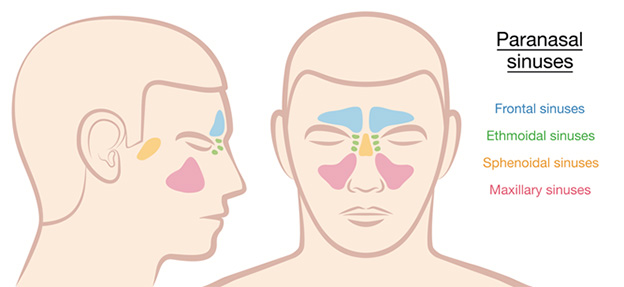
Why Does My Neck Hurt When My Sinuses Are Blocked?
There are several reasons why sinus problems might cause pain in your neck.
Seasonal Allergies Can Trigger Both Sinus and Muscle Pain
Seasonal allergies like hay fever cause inflammation in your nasal passages. But the inflammation doesn’t always stay in your sinuses. It can affect other areas, including your joints and muscles.
This is why some people notice body aches or neck discomfort during allergy season at the same time their sinuses feel blocked.
Muscle Tension from Illness or Stress
When you’re sick, your body is already under stress. Constant sneezing, coughing, and poor sleep make your muscles more likely to tighten.
If you already have an underlying neck condition such as arthritis, disc problems, or past injuries, the extra tension from sinus pressure can make the pain feel worse.
Sphenoid Sinus Pressure
The sphenoid sinus is a deep sinus located behind your eyes and towards the back of your head. When this sinus becomes inflamed, the pain often radiates to the back of the head and neck.
Sphenoid sinus infections are rare, making up only about three percent of all sinus infections. But they can be serious because of their location near important blood vessels and nerves.
If you experience severe face and neck pain along with sinus symptoms, it is best to have it checked by a doctor.
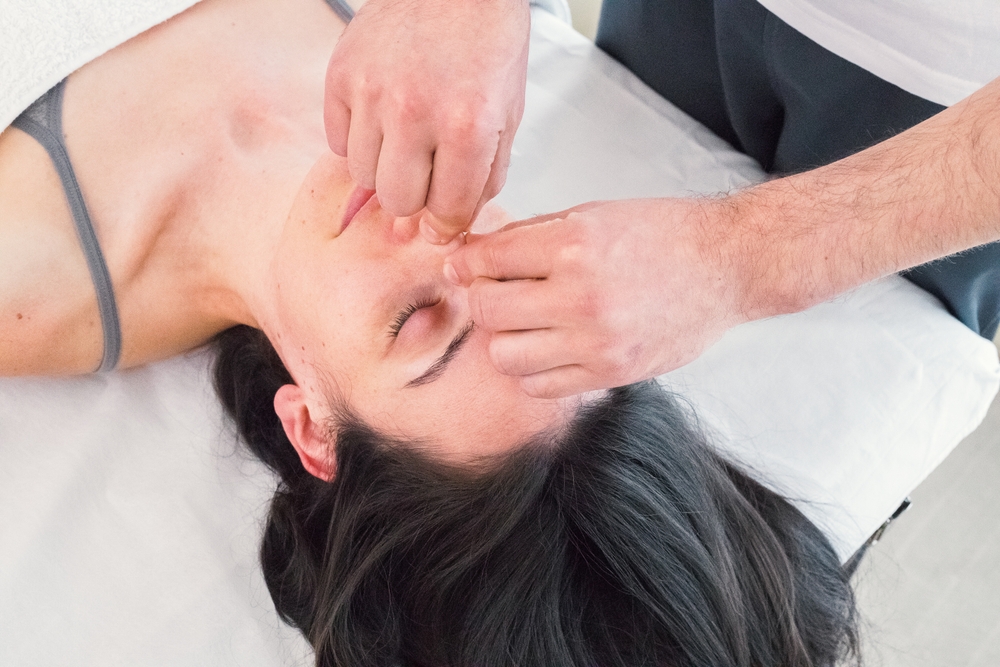
Relieving Sinus-Related Neck Pain
Thankfully, most sinus-related neck pain can be managed with simple measures.
Home Remedies
You can try the following to ease sinus pressure that may be causing neck discomfort:
- Apply a warm compress to your face and neck to relieve tension
- Use a saline nasal spray or rinse to clear congestion
- Take decongestants or antihistamines if allergies are the cause, but always follow your doctor’s advice
- Stay hydrated and rest to help your body recover
- Use pain relief medications like ibuprofen or paracetamol if recommended by your GP
It’s also important to treat the underlying cause, whether it’s a cold, allergies, or chronic sinusitis, so the problem doesn’t keep returning.
When Physiotherapy Can Help
If you notice that every sinus infection or allergy flare-up leaves your neck sore, there might be more than just sinus pressure involved. Pre-existing muscle tightness, poor posture, or an old injury could be contributing to the pain.
Physiotherapy can help by:
- Improving your posture to reduce strain on the neck
- Strengthening and mobilising the neck and surrounding muscles
- Teaching relaxation techniques to manage tension during illness
- Advising on better sleeping positions to avoid stiffness
- Helping rehabilitate old injuries that sinus issues might aggravate
For more details, visit Physiotherapy at Physio Inq.
When to See a Doctor
If you experience severe headaches, fever, confusion, or neck stiffness along with sinus symptoms, see a doctor as soon as possible. These can be signs of a more serious infection that needs urgent medical care.
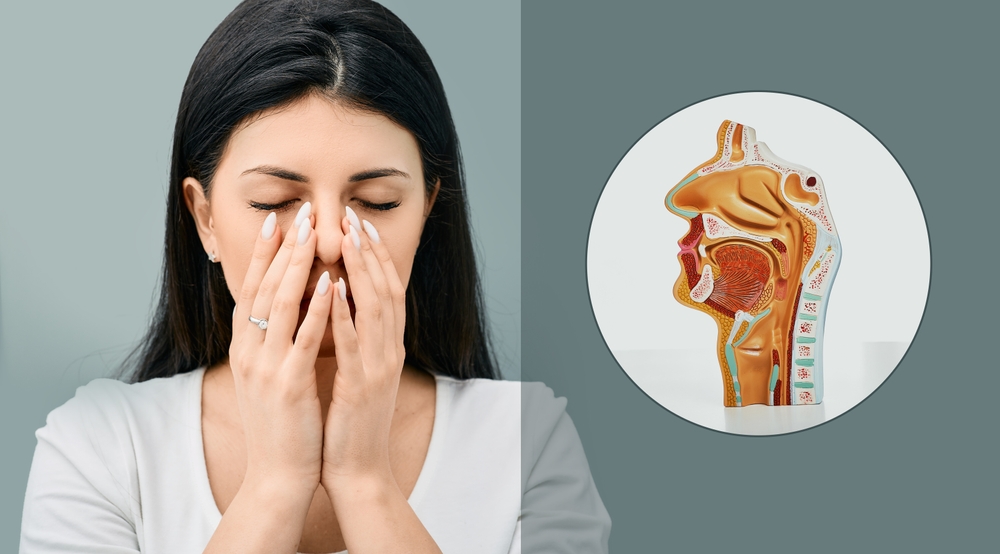
Physiotherapy and Ongoing Neck Pain
Even after sinus symptoms settle, some people continue to have neck discomfort. This can happen if your muscles were already tight or if an old injury was aggravated.
Physiotherapists can help by:
- Prescribing stretches and gentle exercises to reduce tension
- Managing joint conditions like arthritis that flare up during seasonal changes
- Offering strategies to cope with allergy seasons, reducing how much they affect your muscles
Physiotherapy doesn’t treat the sinus infection itself, but it helps ease the secondary muscle pain and stiffness it can cause.

Frequently Asked Questions (FAQs)
Can sinus pressure cause neck pain?
Yes. Sinus pressure can lead to headaches and muscle tightness that spread into the neck and shoulders.
How can I relieve sinus pressure in my neck?
Use warm compresses, stay hydrated, rinse your sinuses with saline, and take any pain relief or antihistamines recommended by your doctor. Physiotherapy can also help with related neck tension.
What is a sphenoid sinus infection, and can it cause neck pain?
The sphenoid sinus sits deep inside the skull. When it becomes inflamed, it can cause pain at the back of the head and neck. Sphenoid sinus infections are rare but should be treated by a doctor.
When should I see a doctor for sinus and neck pain?
Seek medical care if you have sinus symptoms together with fever, neck stiffness, or confusion, as these can be signs of a serious infection like meningitis.

Sinus pressure and neck pain are often connected. Congestion from colds, allergies, or sinus infections can cause headaches and muscle tension that radiate into the neck. In most cases, simple home remedies like warm compresses, sinus rinses, and rest can relieve the discomfort.
If you have ongoing neck pain during every sinus flare-up, or if you already have a history of neck injuries or arthritis, physiotherapy can make a big difference. A physio can help release tension, improve posture, and reduce how much sinus problems impact your daily life.
Next Step
If you suffer from chronic sinus infections or seasonal allergies, let us know. Book an appointment at one of our convenient Physio Inq clinics or let our mobile services come to you. Sinus pressure is no fun and we want to help you feel better, more often. Contact us today!
Our physiotherapists can help you move more comfortably and recover faster, even during allergy seasons or sinus congestion.
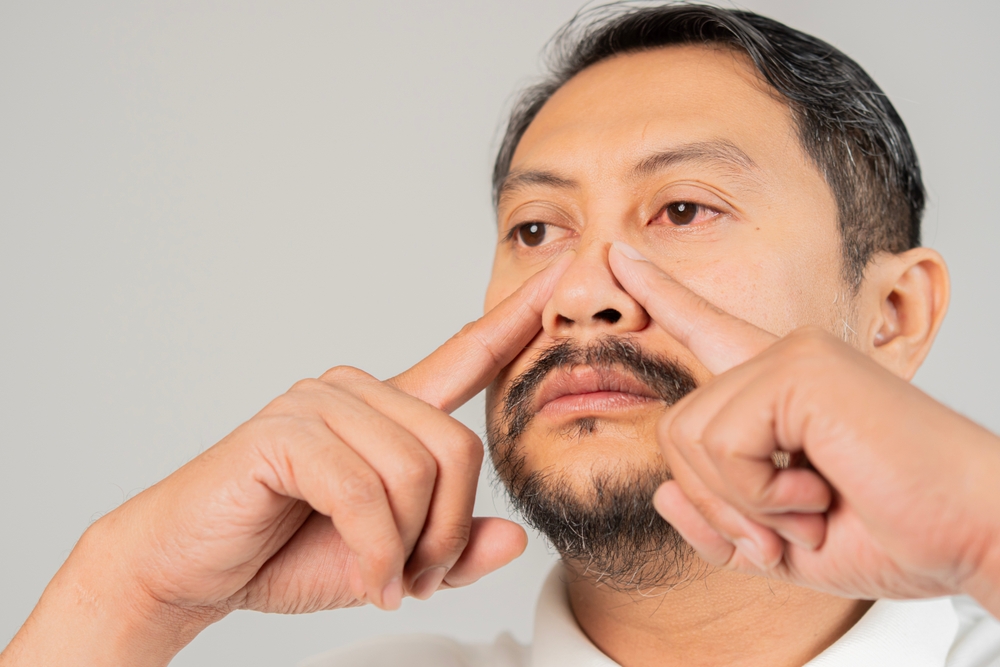
Date Published: Monday, July 26, 2021
Locate a Mobile Physiotherapy
Service Near me
Get the experience & convinence you deserve to support your or a loved one's allied health needs.
Our Mobile Physiotherapy team are currently serving & taking appointments in the following states and regions in Australia:
New South Wales
- Blacktown
- Blue Mountains
- Campbelltown And Macarthur
- Canterbury-Bankstown
- Eastern Suburbs Sydney
- Georges River
- Hawkesbury
- Inner East Sydney
- Inner West Sydney
- Lake Macquarie
- Lower North Shore
- Newcastle
- Northern Beaches
- North Sydney
- Parramatta
- Penrith
- Southern Highlands
- South West Sydney
- Sutherland Shire
- Sydney CBD
- The Hills Shire
- Upper North Shore
- Waverley
- Wollongong
Tasmania
Victoria
Need to get into direct contact with ur Client Services team? We're all ears. Call our team directly on 1300 731 733







